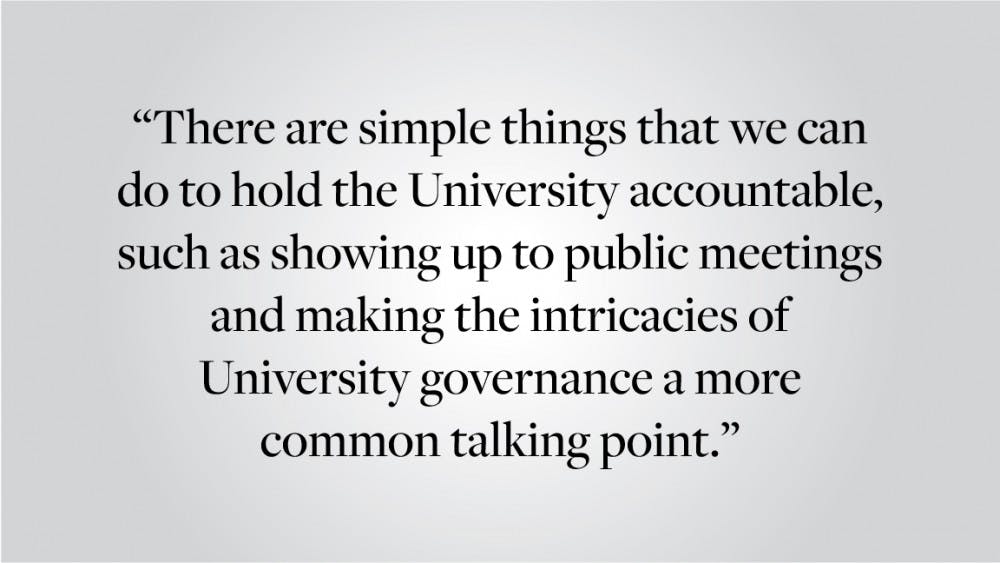In the past several months, the University has made many consequential changes with significant student impacts through its various governance committees. Some of them are related to the COVID-19 pandemic, while others are not. Some were largely understandable and uncontroversial, such as the decision to cancel fall 2020 study abroad programs, which was made in consultation with the International Travel Risk and Assessment Committee. Others have remained notoriously contentious, such as the infamous Excellence in Brown Athletics Initiative, undertaken by the secretive Committee on Excellence in Athletics appointed by President Christina Paxson P’19.
Many committees, as President of the Undergraduate Council of Students Jason Carroll ’21 recently described them, are “undemocratic,” such as the Healthy Fall 2020 Task Force and the new Campus Life Student Advisory Board. While we should certainly push for more democratic representation across University committees whose jurisdictions include student issues, there are also plenty of committees that already have UCS-appointed student representation. Consequently, in addition to advocating for greater student representation across currently undemocratic committees, students should familiarize themselves with University committees in general: Doing so will allow them to be better informed on University governance and be better positioned to influence decision-making if they desire to do so.
The vast majority of students will know that Paxson is Brown’s president. Many other students may also know of Rashid Zia ’01, dean of the college. But many seemingly well-meaning student activism efforts appear to be misdirected, and it is often apparent in improperly addressed change.org petitions. For example, this petition to “Incorporate Diversity and Inclusion into Brown University’s WRIT Requirement” is addressed to Paxson and “The Deans of the College.” Unfortunately, the College itself has no jurisdiction over this requirement, and while it wouldn’t hurt to keep President Paxson as a respondent to the petition, the petition’s organizer should have also included the College Curriculum Council, the Faculty Executive Committee and the Faculty as respondents, as these bodies are ultimately the ones that could implement this change.
Examples like this suggest that students may lack knowledge of University bureaucracy. I don’t blame them — University governance is certainly confusing, and during my entire first year at Brown, I had no idea what the Academic Priorities Committee, the University Resources Committee, or the FEC were until I looked them up in the Faculty Rules and Regulations. To be clear, there is no need to do a close reading of the Faculty Rules, but if students don’t understand how the institution works, it becomes nearly impossible for them to hold the University accountable.
Some committees’ meetings are open to the public, and they have varying degrees of power and influence on University issues. Students should get to know these types of governance committees and attend their meetings at least once in a while. An example of such a body is the CCC, which I served on for three semesters as a UCS appointee from September 2018 to December 2019. In many ways, this body is highly consequential: It approves new concentrations and phases out others, it considers and reviews academic policies and proposes new curricular programs. Other notable committees whose meetings are open to the public are the Advisory Committee on University Resources Management and the Brown University Community Council, a forum for “a university-wide representative forum for discussion, debate, and advisory recommendations” at which any member “of the University community will be afforded an opportunity to address the Council and present issues for discussion at that or future meetings.”
Of course, not all meetings are public, as all of these committees can go into executive session. But greater familiarity, public discussion, praise and criticism of these committees’ work in public settings and social circles will bring more light to them, thereby putting more pressure on them to listen to students. That is reason alone to begin paying attention to them.
In the spring of 2018, I was seeking an appointment from UCS, and I attended a meeting of the CCC for the very first time. After all, the meeting was public, according to the Faculty Rules. But according to a member of the CCC, she couldn’t remember in the past several years any members of the public having attended a meeting of the Council prior to that day. During my service on the CCC, members of the public were only present at a few meetings.
To be sure, some committees are indeed opaque and confidential: They are neither open to the public, nor do they have student representation. This is especially true of faculty committees such as APC, where certain substantial decisions are made. Nevertheless, I would at the very least encourage students to learn about these committees’ decision-making powers. Keeping up to date with decisions, even when we don’t have power over them, will make us all better stewards of our Brown experience.
The Faculty Governance website is available to all current members of the Brown community. Students who care about University administration should spend some time exploring the website, understanding the various types of committees that Brown has and seeing if they know anyone on these committees. Students who have the energy to devote time to University service can even apply to serve on one of these committees, although I do recognize that is not necessarily for everyone.
There are simple things that we can do to hold the University accountable, such as showing up to public meetings and making the intricacies of University governance a more common talking point. As a student body, let’s continue to push for more representation on University committees, but we also need to make an effort to take advantage of all of the mechanisms and opportunities that are already afforded to us.
Poom Andrew Pipatjarasgit ’21 can be reached at poom_pipatjarasgit@brown.edu. Please send responses to this opinion to letters@browndailyherald.com and op-eds to opinions@browndailyherald.com.

ADVERTISEMENT




